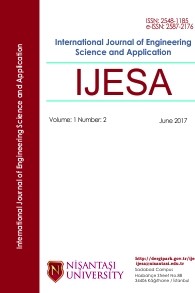Cyber Wars under the Shadow of Artificial Intelligence: A Future Perspective
Cyber Wars under the Shadow of Artificial Intelligence: A Future Perspective
artificial intelligence, cyber wars intelligent systems, intelligent agent, future of artificial intelligence,
___
- [1] A. Martin, “Digital literacy and the ‘digital society’”. Digital literacies: Concepts, policies and practices, 30, 2008, 151-176.
- [2] Y. K. Dwivedi, M. R. Wade, and S. L. Schneberger, Information Systems Theory: Explaining and Predicting Our Digital Society (Vol. 1). 2011, Springer Science & Business Media.
- [3] K. Mossberger, C. J. Tolbert, and R. S. McNeal, “Digital Citizenship: The Internet, Society, and Participation. 2007, MIT Press.
- [4] B. M. Compaine, (Ed.). The Digital Divide: Facing a Crisis or Creating a Myth?. 2001, MIT Press.
- [5] L. Iliadis, I. Maglogiannis, H. Papadopoulos, S. Sioutas, and C. Makris, Artificial Intelligence Applications and Innovations. 2016, Springer International Pu.
- [6] A. I. Strong, “Applications of Artificial intelligence & associated technologies”. Science [ETEBMS-2016], 2016, 5(6).
- [7] N. J. Nilsson, Principles of Artificial Intelligence. 2014, Morgan Kaufmann.
- [8] P. R. Cohen, and E. A. Feigenbaum, (Eds.). The Handbook of Artificial Intelligence (Vol. 3). 2014, Butterworth-Heinemann.
- [9] R. S. Michalski, J. G. Carbonell, and T. M. Mitchell, (Eds.). Machine learning: An artificial intelligence approach. 2013, Springer Science & Business Media.
- [10] M. Chui, Artificial Intelligence the Next Digital Frontier?. McKinsey and Company Global Institute, 2017, 47.
- [11] S. Russell, D. Dewey, and M. Tegmark, M. “Research priorities for robust and beneficial artificial intelligence”. Ai Magazine, 36(4), 2015, 105-114.
- [12] P. Lin, K. Abney, and R. Jenkins, R. (Eds.). Robot Ethics 2.0: From Autonomous Cars to Artificial Intelligence. 2017, Oxford University Press.
- [13] J. Davies, “Program good ethics into artificial intelligence”. Nature, 2016, 538(7625).
- [14] R. V. Yampolskiy, and M. S. Spellchecker, Artificial Intelligence Safety and Cybersecurity: a Timeline of AI Failures. arXiv preprint arXiv:1610.07997, 2016.
- [15] M. R. Waser, Discovering the Foundations of a Universal System of Ethics as a Road to Safe Artificial Intelligence. In AAAI Fall Symposium: Biologically Inspired Cognitive Architectures, 2008 (pp. 195-200).
- [16] V. C. Müller, and N. Bostrom, N. Future progress in artificial intelligence: A survey of expert opinion. In Fundamental issues of artificial intelligence (pp. 553-570). 2016, Springer International Publishing.
- [17] N. Bostrom, Superintelligence: Paths, dangers, strategies. 2014, OUP Oxford.
- [18] S. Schneider, (Ed.). Science Fiction and Philosophy: From Time Travel to Superintelligence. 2016, John Wiley & Sons.
- [19] F. Heylighen, Return to Eden? Promises and perils on the road to a global superintelligence. The End of the Beginning: Life, Society and Economy on the Brink of the Singularity. 2014, Retrieved December 1, 2017, from http://pespmc1.vub.ac.be/Papers/BrinkofSingularity.pdf.
- [20] M. Shanahan, The Technological Singularity. 2015, MIT Press.
- [21] B. Goertzel, “Human-level artificial general intelligence and the possibility of a technological singularity: A reaction to Ray Kurzweil's The Singularity Is Near, and McDermott's critique of Kurzweil”. Artificial Intelligence, 171(18), 2007, 1161-1173.
- [22] R. Kurzweil, The Singularity is Near: When Humans Transcend Biology. 2005, Penguin.
- [23] S. Bernezzani, 10 Jobs Artificial Intelligence Will Replace (and 10 That Are Safe). 2017, HubSpot.com. Retrieved December 1, 2017, from https://blog.hubspot.com/marketing/jobs-artificial-intelligence-will-replace
- [24] R. A. Clarke, and R. K. Knake, Cyber War. 2014, Tantor Media, Incorporated.
- [25] A. A. Galushkin, “Theoretical and legal aspects of cyber warfare”. Mediterranean Journal of Social Sciences, 7(1), 2016, 570.
- [26] J. Chen, and A. Dinerman, On Cyber Dominance in Modern Warfare. In European Conference on Cyber Warfare and Security, 2016, (p. 52). Academic Conferences International Limited.
- [27] J. Arquilla, and D. Ronfeldt, “Cyberwar is coming!”. Comparative Strategy, 12(2), 1993, 141-165.
- [28] J. Stone, “Cyber war will take place!”. Journal of Strategic Studies, 36(1), 2013, 101-108.
- [29] J. Carr, Inside Cyber Warfare: Mapping the Cyber Underworld, 2011, O'Reilly Media, Inc..
- [30] R. V. Yampolskiy, and M. S. Spellchecker, Artificial Intelligence Safety and Cybersecurity: a Timeline of AI Failures, 2016, arXiv preprint arXiv:1610.07997.
- [31] R. Yampolskiy, and J. Fox, “Safety engineering for artificial general intelligence”. Topoi, 32(2), 2013, 217-226.
- [32] Y. LeCun, Y. Bengio, and G. Hinton, “Deep learning”. Nature, 521(7553), 2015, 436-444.
- [33] X. W. Chen, and X. Lin, “Big data deep learning: Challenges and perspectives”. IEEE Access, 2, 2014, 514-525.
- [34] M. A. Alsheikh, D. Niyato, S. Lin, H. P. Tan, and Z. Han, “Mobile big data analytics using deep learning and apache spark”. IEEE Network, 30(3), 2016, 22-29.
- [35] J. Ritz, and Z. Knaack, “Internet of things”. Technology & Engineering Teacher, 76(6), 2017, 28-33.
- [36] L. Atzori, A. Iera, and G. Morabito, “The internet of things: A survey”. Computer Networks, 54(15), 2010, 2787-2805.
- [37] S. Martin, AI warning to humanity: Brain-computer interfaces could be HACKED by robots, experts say, 2017, Express.co.uk – Web Site. Retrieved December 2, 2017, from https://www.express.co.uk/news/science/882933/artificial-intelligence-US-defense-department-elon-musk-neural-implants
- ISSN: 2548-1185
- Başlangıç: 2016
- Yayıncı: Nişantaşı Üniversitesi
Ethics and Safety in the Future of Artificial Intelligence: Remarkable Issues
Utku KOSE, İbrahim Arda CANKAYA, Tuncay YİGİT
Artificial Neural Network Modelling of PP/PET Blends
Murat BEKEN, Fatma ÇAVUŞ KOSOVALI, Yeşim ÖZCANLI
An Anti-Theft Oil Pipeline Vandalism Detection: Embedded System Development
AJAO Lukman, ADEDOKUN EMMANUEL, Nwishieyi Chinonso, Adegboye Mutiu, Agajo James, Kolo Jonathan
Ahmet İrfan YÜKLER, Mustafa Kemal BILICI, Memduh KURTULMUS, Alim KASTAN
Cyber Wars under the Shadow of Artificial Intelligence: A Future Perspective
